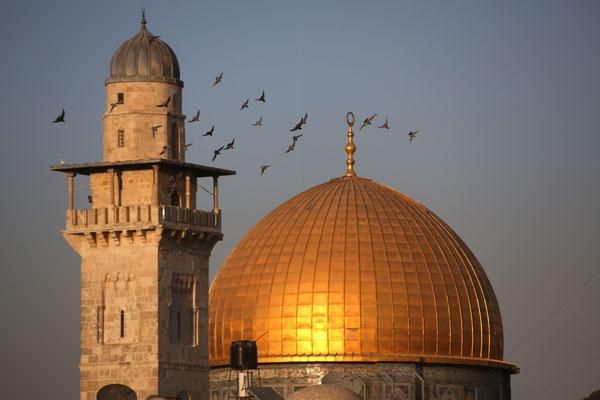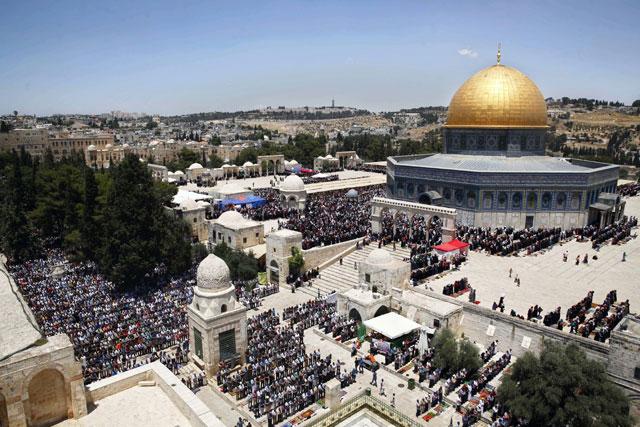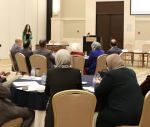You are here
UNESCO’s decision on Jerusalem ‘political, legal victory’ — gov’t
By Omar Obeidat - Oct 15,2016 - Last updated at Oct 15,2016

Birds fly around the Dome of the Rock in Al Haram Al Sharif in Jerusalem's old city on Friday (AFP photo)
AMMAN – The government on Saturday described UNESCO's recent decision on Al Aqsa Mosque/Al Haram Al Sharif in East Jerusalem as a political and legal victory against the Israeli occupation.
On Thursday, the UN cultural organisation adopted a resolution classified under "Occupied Palestine" at committee level that stressed the need to "safeguard the Palestinian cultural heritage and the distinctive character of East Jerusalem".
The decision called on Israel to allow the restoration of the historic status quo of Al Aqsa Mosque/Al Haram Al Sharif, condemning escalating Israeli aggressions against the Jerusalem Awqaf Department personnel.
The decision on Jerusalem was taken during UNESCO Executive Board's 200th session meetings, held in Paris, which approved all moves Jordan has taken in the interest of the holy city, especially during the past three years, according to the text of the resolution posted on UNESCO’s website.
Minister of State for Media Affairs and Government Spokesperson Mohammad Momani said the adoption of the decision by UNESCO’s executive board underlines Jordan's determination to move forward with its legal and diplomatic options to protect and defend Islamic and Christian sites that fall under the Hashemite custodianship led by His Majesty King Abdullah.
The Jordan News Agency, Petra, said that the Foreign Ministry prepared the decision and presented it to the permanent Jordanian delegation at UNESCO, in coordination with the Palestinian delegation, to approve the consideration of “Al Aqsa Mosque” and “Al Haram Al Sharif” as synonyms, in response to Israeli authorities’ attempts to differentiate between the two terms and what they refer to.
Momani told The Jordan Times that Jordan is proud to be the Muslim and Arab country that spearheads efforts to protect the holy shrines in Jerusalem, urging the international community to support the enforcement of international law and to put an end to Israeli occupation.
The official said that Israel has to bow to international law and resolutions; meanwhile, Jordan will continue its efforts to maintain the historic status quo of Al Aqsa Mosque/Al Haram Al Sharif.
Under the status quo, the Jordanian Awqaf Department is entitled to exercise exclusive authority over Al Aqsa Mosque/Al Haram Al Sharif, and its mandate is extended to all affairs relating to the administration of the mosque, including maintenance, restoration and regulating access.
The decision reaffirmed that the “Mughrabi Gate” (Bab Al Magharbeh) is an integral and inseparable part of Al Aqsa Mosque, and called on Israel, as an occupation force, to allow the restoration of the historic status quo that prevailed until September 2000.
The UNESCO decision angered the Israeli government, which on Friday suspended its cooperation with the UN agency.
What angered Israeli authorities is that the decision referred to the Al Aqsa Mosque/ Al Haram Al Sharif in East Jerusalem’s Old City — Islam’s third holiest site — without any reference to the site also being revered by Jews as what they describe as the Temple Mount, according to Agence France Presse (AFP).
In April 2015, UNESCO’s executive board adopted a resolution submitted by Jordan and Palestine that reaffirmed the definition of Al Aqsa Mosque as the entire sacred complex surrounding it and since then, the term used to refer to the Muslim shrine has become Al Aqsa Mosque/Al Haram Al Sharif.
In a bid to absorb the anger of the Israeli government, Irina Bokova, UNESCO Director-General, said in a statement on Friday that Jerusalem is the sacred city of the three monotheistic religions — Judaism, Christianity and Islam.
“It is in recognition of this exceptional diversity, and this cultural and religious coexistence, that it was inscribed on the UNESCO World Heritage list,” she added.
The heritage of Jerusalem is indivisible, and each of its communities has a right to the explicit recognition of their history and relationship with the city. To deny, conceal or erase any of the Jewish, Christian or Muslim traditions undermines the integrity of the site, and runs counter to the reasons that justified its inscription on the UNESCO World Heritage list, Bokova said.
Palestinian Foreign Minister Riad Malki slammed what he called Bokova’s “unusual and unacceptable position”, which was “an affront to the sovereignty of the Governing Body of UNESCO”.
“Bokova should focus her efforts on implementing the will of member states and preserving Jerusalem from the occupying power’s systematic colonisation,” Malki said in a statement carried by AFP.
Related Articles
AMMAN/PARIS — Jordan on Tuesday renewed its stand celebrating a ‘victory’ in UNESCO, which officially adopted an Arab-sponsored resolution c
AMMAN — UNESCO’s World Heritage Committee, comprising of representatives from 21 countries, on Wednesday adopted another resolution on Jerus
AMMAN — UNESCO on Tuesday adopted the Jordanian-drafted resolution on Jerusalem, following a "diplomatic showdown” with some member states t


















